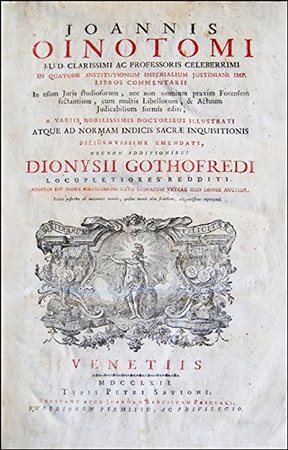 Bibliopathos - Via Enrico Toti 1, 37129 Verona
Bibliopathos - Via Enrico Toti 1, 37129 Verona
Medieval Notary Manuscripts & Law Books Sessione Unica - dal lotto 1 al lotto 280
Monday 28 December 2015 hours 17:00 (UTC +01:00)
OINOTOMUS' RENOWNED COMMENTARY TO THE JUSTINIAN'S INSTITUTIONSOinotomus,...
OINOTOMUS' RENOWNED COMMENTARY TO THE JUSTINIAN'S INSTITUTIONS
Oinotomus, Johannes. Joannis Oinotomi ... in quator Institutionum imperialium Justiniani imp. libros commentarii in usum juris studiosorum. Venetiis, typis Petri Savioni, prostant apud Joannem Baptistam Pasquali, 1762.
Folio, contemporary half vellum on colored paper,2 preliminary leaves, pp. 615, [1] .
Text in Latin, printed in two columns.
Title vignette (Pasquali's device, with motto: Litterarum felicitas).
At end: Noi riformatori dello studio di Padova. Concedemo licenza a Pietro Savioni stampator di Venezia poter ristampare il libro intitolato Joannis Oinotomi ... Comentarij &c. osservando gli ordini soliti in materia di stampe, & presentando le copie alle pubbliche librarie di Venezia, e di Padova. Dat. li 13. Maggio 1760. Angelo Contarini ... Bernardo Nani ... Francesco Morosini ... Registrato in libro a cart 50. al num. 303 Gio: Girolamo Zuccato, segretario.
Title-page in red and black types, woodcut head and -tail pieces, woodcut head-letters.
The renowned commentary to the Justinian's Institutions written by Joannes Oinotomos (Johann Schneidewein), first printed in 1573 and re-issued many times along the following two centuries.
To this edition are added the addition of the French juruist Denis Godefroy.
The text is organized according to the theories of Protestant Reform, whose application Martin Luther charged Philip Melanchton.
Johann Schneidewein (1519-1568), was a famous German jurist, scholar of Martin Luther at Wittenberg. He followed his teacher all along his life, obtaining prestigious political and academic tasks, in the German protestant electorate. He considered a fake the donation of Constantine and, consequently, he deemed illegitimate the temporal power of the Roman papacy.
References: OCLC 3833087.








